
Latest News Regarding
Horn of Africa
New report sheds light on Pentagon’s secret wars
New report sheds light on Pentagon’s secret wars

Source: The Intercept, Saturday November 5, 2022
ByNick Turse
The analysis suggests that the U.S. war in Somalia was waged with no clear legal basis.
Nick Turse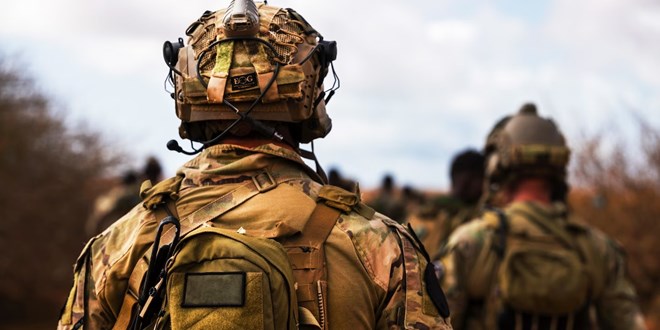
U.S. forces conduct ground warfare training with the Danab Brigade in Somalia, March 31, 2021. Photo: Staff Sgt. Zoe Russell/U.S. Air Force
THE UNITED STATES has fought more than a dozen “secret wars” over the last two decades, according to a new report from the Brennan Center for Justice at New York University’s School of Law. Through a combination of ground combat, airstrikes, and operations by U.S. proxy forces, these conflicts have raged from Africa to the Middle East to Asia, often completely unknown to the American people and with minimal congressional oversight.
“This proliferation of secret war is a relatively recent phenomenon, and it is undemocratic and dangerous,” wrote Katherine Yon Ebright, counsel in the Brennan Center’s Liberty and National Security Program. “The conduct of undisclosed hostilities in unreported countries contravenes our constitutional design. It invites military escalation that is unforeseeable to the public, to Congress, and even to the diplomats charged with managing U.S. foreign relations.”
These clandestine conflicts have been enabled by the 2001 Authorization for Use of Military Force, enacted in the wake of the September 11 attacks, as well as the covert action statute, which allows secret, unattributed operations, primarily conducted by the CIA. The United States has also relied on a set of obscure security cooperation authorities that The Intercept has previously investigated, including in an exposé earlier this year that revealed the existence of unreported U.S. counterterrorism efforts in Egypt, Lebanon, Syria, and Yemen. Ebright documents so-called 127e programs, known by their legal designation, in those countries and 12 others: Afghanistan, Cameroon, Iraq, Kenya, Libya, Mali, Mauritania, Niger, Nigeria, Somalia, and Tunisia, as well as a country in the Asia-Pacific region that has not yet been publicly identified.
The 127e authority, which allows U.S. commandos to employ local surrogates on U.S.-directed missions, targeting U.S. enemies to achieve U.S. aims, is just one of three low-profile efforts analyzed in the Brennan Center report. Another, 10 U.S. Code § 333, often referred to as the “global train-and-equip authority,” allows the Pentagon to provide training and gear to foreign forces anywhere in the world. The far murkier 1202 authority allows the Defense Department to offer support to foreign surrogates taking part in irregular warfare aimed at near-peer competitors like China and Russia.
The report, released Thursday, offers the most complete analysis yet of the legal underpinnings, congressional confusion, and Pentagon obfuscation surrounding these efforts and explains how and why the Defense Department has been able to conduct under-the-table conflicts for the last 20 years.
“The Brennan Center’s report underscores the need to shine a light on our defense activities that have been cloaked in secrecy for too long. At the bare minimum, the public and Congress need to know where and why we’re sending our service members into harm’s way,” Rep. Sara Jacobs, D-Calif., a member of the House Armed Services Committee, told The Intercept. “I hope this report strengthens the urgency of Congress taking back its war powers, eliminating existing loopholes in security cooperation programs, and ensuring our strategies match our values, goals, and commitment to our service members.”
“Congress’s understanding of U.S. war-making is often no better than the public record,” writes Ebright. “The Department of Defense’s diplomatic counterparts in the Department of State also struggle to understand and gain insight into the reach of U.S. hostilities. Where congressional oversight falters, so too does oversight within the executive branch.”
Ebright’s analysis is particularly illuminating in the case of Somalia, where the United States developed two key proxy forces, the Danab Brigade and the Puntland Security Force. The CIA began building the Puntland Security Force in 2002 to battle the Al Qaeda-affiliated al-Shabab and later the Islamic State in Somalia, or ISS. The force was transferred to U.S. military control around 2012 and went on to fight alongside U.S. Special Operations forces for a decade. “In Puntland, we built that capability, training them at the tactical level and in how to support themselves and follow a good counterinsurgency strategy against al-Shabab,” Don Bolduc, the former chief of Special Operations Command Africa and now the Republican candidate for Senate in New Hampshire, told The Intercept in a 2019 interview.
Ebright notes that the proxy fighters were “largely independent of the Somali government, despite being an elite armed brigade and one of Somalia’s most capable special operations units. And their relationship with U.S. forces was long kept secret, with U.S. officials disavowing the presence of military advisers in Somalia until 2014.”
More troubling, her analysis suggests that for a significant period of time, there was no clear legal basis for the U.S. military to fight alongside and direct these forces. The Obama administration designated al-Shabab an associated force of Al Qaeda and thus, a legitimate target under the 2001 AUMF in 2016. That administration did the same for the Islamic State in 2014, but ISS has never been publicly identified as an ISIS-associated force by any administration. This means that the Pentagon developed and fought alongside the Puntland Security Force from 2012 and the Danab Brigade from 2011 — under the 127e and 333 security cooperation authorities — before the AUMF was judged to authorize hostilities against al-Shabab and ISIS, much less ISS.
“The Department of Defense is unequivocal that it does not treat § 333 and 127e as authorizations for use of military force. The reality is not so clear,” writes Ebright. “After all, U.S. forces have used these authorities to create, control, and at times engage in combat alongside groups like the Puntland Security Force and Danab Brigade.”
Over the last 20 years, presidents have consistently claimed broad rights to act in self-defense, not only of U.S. forces but also for partners like the Puntland Security Force and Danab Brigade, which, Ebright notes, potentially allows the U.S. to fight remote adversaries in the absence of any congressional authorization.
Rep. Jacobs said it was difficult to assure the military community in her San Diego district “that we’re doing everything we can to keep them safe when Congress has such little information, let alone oversight over when, where, and how we’re using military force. Attempts to avoid scrutiny from Congress – and Congress’s own abdication of our war powers – is central to how we ended up in forever wars, the spike in civilian casualties, and failed strategies that waste taxpayer dollars and fuel the very conflicts we’re trying to solve.”
Expansive definitions of collective self-defense of proxies are also especially worrisome in regard to the 1202 authority, which requires even less oversight than 333 and 127e and is “used to provide support to foreign forces, irregular forces, groups, or individuals” taking part in irregular warfare. While patterned after 127e, 1202 is aimed not at regional terrorist groups like al-Shabab and ISS but at “rogue states,” such as Iran or North Korea, or near-peer adversaries like Russia and China. “The executive branch’s broad interpretation of its use of force authorities, when combined with 1202, can lead to combat, which Congress hasn’t approved, against powerful states,” Ebright told The Intercept. “For the 1202 authority to have so little oversight when the risks it carries — when you’re running proxy forces against powerful, even nuclear-armed states — is a major mistake.”
The report offers suggestions for improving congressional and public oversight, enforcing the balance of war powers within the government, and preventing hostilities unauthorized by Congress. “Repealing §§ 333, 127e, and 1202 would return the balance of power to where it stood before the war on terror,” Ebright writes, forcing the Pentagon to convince Congress that building foreign proxies abroad is in the United States’s national security interest. This is critical given that working by, with, and through foreign surrogates and allies is key to the Pentagon’s global vision, according to the Biden administration’s recently released National Security Strategy and National Defense Strategy.
“Both of those documents underscore that the DOD views security cooperation as the future of its approach,” Ebright told The Intercept. “Meanwhile, on Capitol Hill and in the broader public, we don’t have conversations about what this means, to the detriment of voters understanding where we’re at war and how this is going to affect military involvement and entrenchment abroad.
Experts say climate change accelerating conflicts in Africa
Experts say climate change accelerating conflicts in Africa

Source: Xinhua, Saturday November 5, 2022

The Horn of Africa has registered a rise in conflicts because of an increase in climate disasters, experts said on Friday.
Linda Ogallo, a climate adaptation expert at the Inter-Governmental Authority on Development (IGAD) Climate Prediction and Applications Center (ICPAC), said drought and floods are some of the climate events that have accelerated conflicts in the Horn of Africa.
“A big block of communities in the Horn of Africa are farmers who rely on agriculture and pastoralism. Therefore, their lives are tied to climate. Any negative event leads to disruption of livelihoods and displacement that push people to new areas leading to inter-community or cross-border conflicts,” said Ogallo during a virtual forum on climate change, peace and security.
She identified South Sudan, Kenya and Somalia as the countries where climate events are causing conflict.
She said South Sudan has endured the worst flooding in the past months while drought is ravaging Somalia and Kenya.
More than 800,000 people have been affected by floods in South Sudan that have caused displacements and food insecurity challenges increase conflicts between communities, according to the United Nations.
In Kenya, the movement of pastoralists in search of pasture in other areas due to drought has led to fights between communities, causing deaths.
“In Somalia, it started with drought, then desert locusts, then floods, followed by the pandemic, and now drought. It has been one extreme event after another that communities have had no chance to recover,” she said.
Ogallo said the frequent climate events are putting financial strain on African governments, which now have to use development money for emergency response activities.
She said IGAD is hoping to have a coordinated mechanism for dealing with security challenges arising from climate change.
Elizabeth Carabine, the climate security advisor at the Office of the Special Envoy of the UN Secretary-General to the Horn of Africa, said climate events force people to move, increasing competition for resources and leading to conflicts.
“People displaced by climate events are more prone to conflicts that lead to instabilities. Climate change has become a threat to peace and security, and that is a discussion African governments, African Union, and other regional bodies must be prepared to have and find solutions,” she said.
President says We shall not accept international donations through the government of Somalia
President says We shall not accept international donations through the government of Somalia
Source: Somaliland Standard, By admin -November 3, 20220105

By M.A. Egge
The President of the Republic of Somaliland H.E. Muse Bihi Abdi who was flanked by the Minister of Foreign Affairs Hon. Dr. Issa Keyd Mohamud held a video conference with the British Ambassador and the Acting Ambassador of the United States.
According to a press release issued by the Presidency On Tuesday 1st November 2022, the President informed the ambassadors about the general situation of drought in Somaliland, estimated to have afflicted about one and a half million people who are direly in need of humanitarian aid.
He spoke at length about the fact that aid for Somaliland should not be channeled through another party but should be based on Somaliland’s plan. President Musa Bihi also explained the country’s activities for the upcoming elections of the political organizations and parties and the preparation of the next elections.
He said that the government has allocated the expenses that will be spent on the registration and the elections.
On their part the ambassadors of the United Kingdom and the United States thanked the President for the virtual meeting they had and promised to work closely with Somaliland.
Djibouti Police Chief arrives in Hargeisa, Somaliland
Djibouti Police Chief arrives in Hargeisa, Somaliland
Source: Somaliland.com, ByChief Editor on November 2, 2022
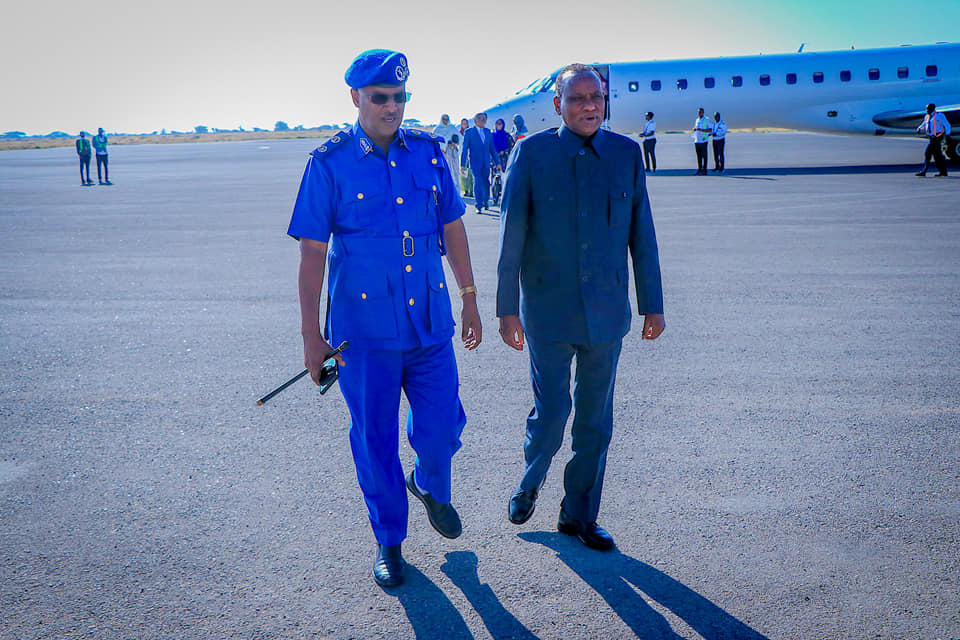
The Djiboutian Police chief Abdirahman Ali arrived in Hargeisa on Wednesday morning. His Somaliland counterpart Mohamed Adam Saqadhi (Dabagale) received him at the airport. In a statement Somaliland Police clarified that the Djiboutian Police chief arrived in Hargeisa to attend the 29th Anniversary of Somaliland police forces.
It’s unclear if other regional dignitaries will arrive to attend the anniversary which is expected to take place on Thursday, according to the Somaliland police. Earlier this year, the police chief of Somaliland paid a visit to Djibouti to meet his counterpart and had discussed strengthening the security cooperation between the countries.
Since Djibouti’s terrorist attack in 2014, the neighboring countries seem to have boosted their security cooperation. On several occasions, officials from the two countries engaged in talks to enhance the safety of their populations.
Ethiopian, Djibouti doctors arrive in Mogadishu to treat blast victims
Ethiopian, Djibouti doctors arrive in Mogadishu to treat blast victims

Source: Thursday November 3, 2022
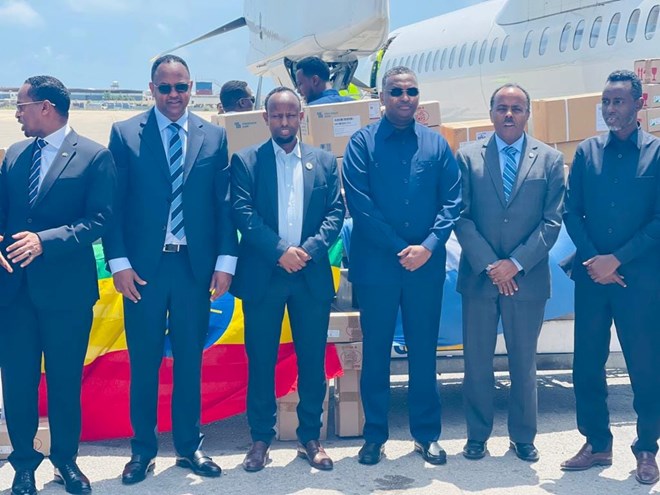
Mogadishu (HOL) – Medical professionals from Ethiopia and Djibouti arrived in Mogadishu on Thursday, answering the Somali President’s call requesting doctors and surgeons from friendly countries to aid Saturday’s terror attack victims.
Somalia’s Health Minister, Dr. Ali Haji Aden Adan and senior government figures welcomed a delegation of Ethiopian doctors to Mogadishu’s airport.
According to the ministry of health, the Ethiopian health team consists of veteran surgeons who will get to work immediately.
Earlier in the day, the government of Djibouti sent a specialist doctor and medicine to Somalia.
President Hassan Sheikh Mohamud and the federal health minister appealed to the international community to send aid, medicine and doctors in the wake of a horrific terror attack on Saturday that killed over 100 people.
The deadly terror attack occurred at the same busy intersection where al-Shabab militants killed over 500 people five years earlier in a similar truck bomb attack.
The Al Qaeda-linked militant insurgent group al Shabab has claimed responsibility for the attack.
The federal government formed a ten-person committee led by the health minister to coordinate the emergency response.
A team of Turkish doctors arrived in Somalia’s capital on Wednesday to treat blast victims. Four victims with serious injuries were airlifted to be treated in Turkish hospitals.
Somalia’s President said the attack strengthened the resolve of the Somali people to continue their fight against al-Shabab.
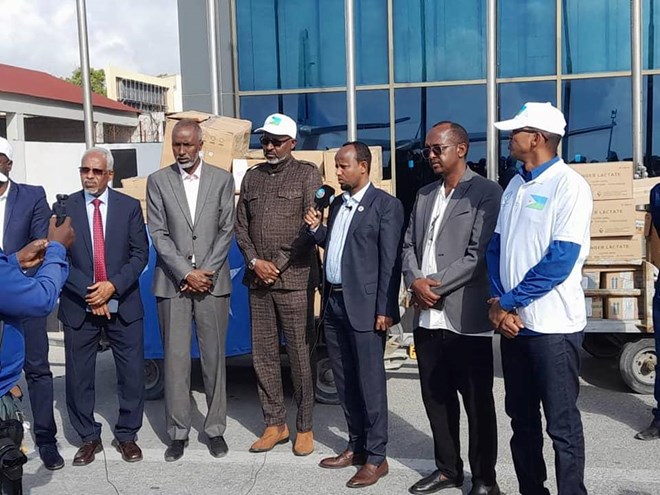
Turkish government sends doctors to Somalia and airlifts injured people to Turkey for treatment
Turkish government sends doctors to Somalia and airlifts injured people to Turkey for treatment

Source: Hiiraan Online, Thursday November 3, 2022
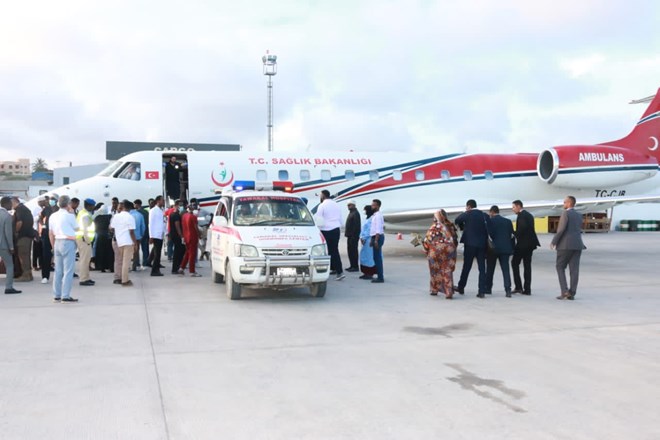
Mogadishu (HOL) – Somali Minister of Health Dr. Ali Adan welcomed Turkish specialist doctors who have flown into Mogadishu to treat victims of Saturday’s deadly terror attack, which claimed over 120 lives and wounded at least 330.
The health ministry did not specify how many doctors and medical professionals have arrived in Somalia.
the same time, four victims with serious injuries were airlifted to Türkiye on a plane sent by the Turkish health ministry.
On Monday, The federal government formed a committee led by the health minister to coordinate the emergency response.
The President appealed to Kenya, Türkiye, Egypt and Saudi Arabia to send doctors, medicine and equipment.
Türkiye embassy in Mogadishu said it was responding to the call of Somali President Hassan Sheikh Mohamud.
The Ministry added that it is also an opportunity for the local Somali doctors and surgeons to gain indispensable experience.
The Somali presidency said Mohamud had spoken to Turkish President Recep Tayyip Erdogan, who conveyed a message of condolence to the government and people of Somalia following the terrorist attack in Mogadishu.
Saturday’s deadly terror attack occurred at the same busy intersection where, on October 14, 2017, a suicide bomber driving a truck laden with military-grade explosives levelled several city blocks. The terror attack – the deadliest in Somalia’s history – killed 512 people and wounded more than 290 others.
Ethiopia’s government and Tigray forces agree to end two-year war
Ethiopia’s government and Tigray forces agree to end two-year war

Source: ABC, Thursday November 3, 2022
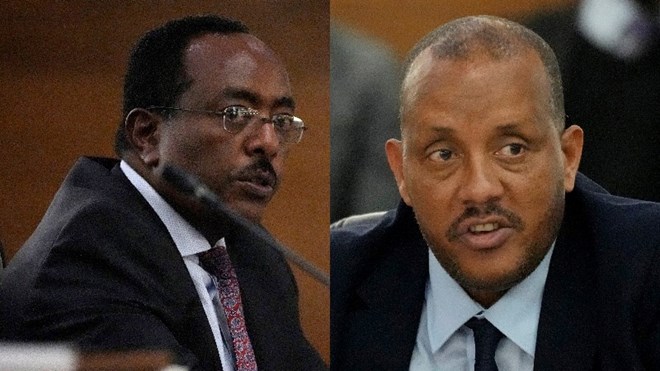
Lead negotiator for Ethiopia’s government, Redwan Hussein (left) and Tigray negotiator Getachew Reda during negotiations in Pretoria.(AP: Themba Hadebe)
Ethiopia’s warring sides have agreed to a permanent end to hostilities in a conflict believed to have killed hundreds of thousands.
Just over a week after formal peace talks mediated by the African Union began in South Africa, delegates from both sides signed an agreement on a “permanent cessation of hostilities”.
The war in Africa’s second-most populous country, which marks two years on Friday, has seen abuses documented on both sides, with millions of people displaced and many near famine.
The war might have officially ended but enormous challenges still lie ahead, including getting all parties to lay down arms or withdraw.
How did we get here?
Tensions had been escalating in 2018, when Ethiopian Prime Minister Abiy Ahmed’s government made a peace deal with Eritrea, the nation that borders the Tigray region.
For the Tigray People’s Liberation Front — or TPLF, a guerilla movement turned political party that ruled Ethiopia for nearly three decades before Mr Abiy took office — Eritrea was a sworn enemy.
In response to that peace deal, the TPLF defied Mr Abiy by holding regional elections in Tigray that he had postponed nationwide.
Mr Abiy’s government then declared the TPLF a terrorist organisation, tipping both sides into war.
The TPLF accused Mr Abiy of centralising power at the expense of the regions and oppressing Tigrayans, which he denies.
Meanwhile, Mr Abiy accused the TPLF of seeking to return to power at the national level, which it rejects.
The war led to human rights violations by all sides, including extra-judicial killings, raping, looting and displacing people by force — all of which have been documented by UN bodies, Ethiopia’s state-appointed human rights commission, independent aid groups and media.
All sides have denied the allegations.
The details of the peace deal
A draft agreement said the Ethiopian government would facilitate lifting the terrorist declaration.
The draft text also said Tigray forces would be disarmed, starting with “light weapons”, within 30 days of Wednesday’s signing.
Ethiopian federal security forces will also take full control of “all federal facilities, installations, and major infrastructure such as airports and highways within the Tigray region”.
The final agreement was not made public, but the brief joint statement notes “a detailed program of disarmament” and “restoration of constitutional order” in Tigray.
Ethiopia’s government will continue restoring basic services to the Tigray region, where communications, transport and banking links for more than 5 million people have been severed since fighting began.
The parties also committed to unfettered humanitarian access.
Kenyan President Uhuru Kenyatta helped facilitate the talks and an African Union panel with representatives from both sides and Africa experts will monitor the process.
It’s not clear when independent journalists and human rights researchers would be allowed into Tigray.
“The level of destruction is immense,” said the lead negotiator for Ethiopia’s government, Redwan Hussein.
Lead Tigray negotiator Getachew Reda expressed a similar sentiment, saying “our people have been killed not only through bullets, but also, for lack of food and medicine”.
Exhausted Ethiopians, urged by the parties to “stop voices of division and hate”, watched them shake hands.
Reactions to the agreement
Olusegun Obasanjo, Head of the African Union mediation team:
“The two parties in the Ethiopian conflict have formally agreed to the cessation of hostilities as well as to systematic, orderly, smooth and coordinated disarmament.
“This moment is not the end of the peace process. Implementation of the peace agreement signed today is critical for its success.”
Abiy Ahmed, Ethiopia’s Prime Minister:
“The agreement signed today in South Africa is monumental in moving Ethiopia forward on the path of the reforms we embarked upon four and a half years ago.
“Our commitment to peace remains steadfast. And our commitment to collaborating for the implementation of the agreement is equally strong.”
Getachew Reda, spokesman for the Tigray authorities:
“Making peace has proved more difficult and more intractable and elusive than presiding over the killing of women and children and destruction of property.
“The war over the last two years has claimed the lives of hundreds of thousands and has turned Ethiopia, once on the cusp of great economic progress, into a bad parody of itself and caused tremendous suffering to the people of Tigray.”
Stephane Dujarric, United Nations spokesman:
“It is very much a welcome first step, which we hope can start to bring some solace to the millions of Ethiopian civilians that have really suffered during this conflict.”
Uhuru Kenyatta, former Kenyan president and facilitator of the talks:
“The lasting solution can only be through political engagement and being able to accommodate our differences, our diversity, while still remaining a united Ethiopia. It’s my hope that all parties will go back and … begin the process of dialogue. The lasting solution can only be dialogue.”
Redwan Hussein, Abiy’s national security adviser and lead negotiator:
“The level of destruction is immense and the darkness massive.
“We thank our brothers from the other side also for this constructive engagement to allow the country to put this tragic period of conflict behind us. It is now for all of us to honour this agreement. We must be true to the letter and to the spirit of this agreement.”
What happens now?
Some major questions remain, including how neighbouring Eritrea will respond.
Eritrea was not part of the talks and it’s not clear to what extent its government, which has long considered Tigray authorities a threat, will respect the agreement.
The draft agreement did say the Ethiopian and Tigray sides would agree to stop “collusion with any external force hostile to either party”.
Eritrean forces have been blamed for some of the conflict’s worst abuses, including gang rapes, and witnesses have described killings and lootings by Eritrean forces even during the peace talks.
Forces from Ethiopia’s neighbouring Amhara region also have been fighting Tigray forces, but Amhara representatives were also not part of the talks.
Another critical question is how soon aid can return to Tigray.
The United Nations says the war has led to a de facto blockade of Tigray that has lasted close to two years, with humanitarian supplies of food and medicines unable to get through most of the time.
Doctors have described running out of basic medicines like vaccines, insulin and therapeutic food while people die of easily preventable diseases and starvation.
UN human rights investigators have said the Ethiopian government was using “starvation of civilians” as a weapon of war.
Ethiopia’s government has consistently denied blocking aid and has said it was distributing food and restoring electricity and other services to areas under its control.
The African Union said in a statement it stood ready to continue accompanying the Ethiopian peace process “towards a more democratic, just and inclusive Ethiopia in which youth, women and men participate fully and in peace”.
“The lasting solution can only be dialogue,” said former Kenyan president Uhuru Kenyatta, a co-mediator in the talks.
Ethiopian Peace Talks Extended
Ethiopian Peace Talks Extended
Source: The Associated Press published on 31 October 2022 an article titled “Peace Talks on Ethiopia’s Tigray Conflict Are Extended” by Cara Anna.
African Union-led peace talks in South Africa on the Ethiopian conflict that were scheduled to end last week have been extended into this week. There has been no discussion so far of results from the talks.
Somalia: Al-Shabaab must urgently stop carrying out attacks against civilians
Somalia: Al-Shabaab must urgently stop carrying out attacks against civilians

Tuesday November 1, 2022

Credit: Mohamed Bulbul, a journalist based in Mogadishu, Somalia.
The armed group Al-Shabaab must end its indiscriminate attacks against civilians and the Somali authorities must also ensure that civilians are protected, Amnesty International said today, after a twin car bombing in Mogadishu on Saturday, claimed by Al-Shabaab, killed at least 100 people and injured more than 300 others.
The bombings, claimed by the armed group Al-Shabaab, targeted the ministry of education building and took place on a busy market intersection in the Somali capital. Numerous children and elderly people were among the victims. On Saturday evening, President Hassan Sheikh Mohamud warned that the death toll could rise further.
“Amnesty International sends its condolences to all those who have lost loved ones following Saturday’s appalling and senseless attacks. Al-Shabaab’s callous actions are crimes under international law and it is absolutely crucial that all those suspected of criminal responsibility for this crime face justice in fair trials,” said Muleya Mwananyanda, Amnesty International’s Director for East and Southern Africa.
“Al-Shabaab specifically designed the attack to inflict massive civilian casualties. Intentionally targeting civilians in an armed conflict is a war crime and, as such, all states are permitted to exercise jurisdiction to investigate and prosecute. Al-Shabaab must immediately stop carrying out attacks on civilians, and the Somali authorities must ensure that victims’ families are offered justice, truth and reparation.”
Following the bombings, devastated friends and relatives of victims shared accounts of what happened on social media. Many are still searching for missing family members. Mogadishu’s hospitals are currently overwhelmed as they seek to support those injured in the attacks.
No accountability
The ongoing conflict between the government of Somalia and Al-Shabaab continues to have a devastating impact on the country’s civilian population, with all parties to the conflict continuing to commit serious violations of international humanitarian law — with no justice, truth or reparation.
In May 2022, Somalia’s new government identified maintaining national security and combatting Al-Shabaab as its top priority. Since then, the armed group has responded with both indiscriminate and targeted attacks against civilians, as well as assassinations and summary killings of those it perceives to be linked to the government. In August, Al-Shabaab carried out an attack on Hotel Hayat in Mogadishu, killing at least 30 people and injuring more than 50 others.
Of 428 civilian casualties reported by the UN in Somalia between February and May this year, 76 percent are believed to be the result of indiscriminate attacks by Al-Shabaab.
Saturday’s attack came five years after another bombing in the same location, which killed almost 600 people and injured more than 300 others in what is believed to be Africa’s deadliest truck bombing. Although widely assumed to have been carried out by Al-Shabaab, the group has not claimed responsibility for it.
Since 2011, Al-Shabaab has increasingly targeted locations frequented by civilians, including hotels and restaurants, for attacks that have killed and injured thousands of civilians.
Security Council extends UNSOM mandate for another year
Security Council extends UNSOM mandate for another year

Source: Hiiraan Online, Tuesday November 1, 2022
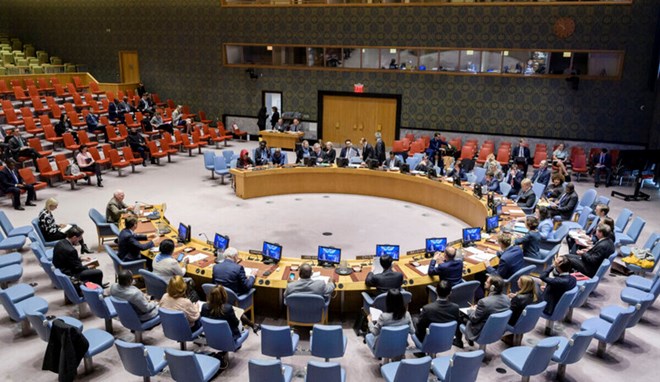
Mogadishu (HOL) -The UN Security Council expressed worry over the ongoing risks posed by Al Shabab terrorists as it unanimously voted on Monday to prolong the UN Assistance Mission in Somalia (UNSOM) for an additional year.
“The Council requested UNSOM to maintain and strengthen its presence across Somalia and to continue to cooperate with that country and the African Union Transition Mission in Somalia (ATMIS).”The Council also denounced any abuse or obstruction of humanitarian aid through the resolution, and it demanded that all parties permit and facilitate full, safe, quick, and unfettered access for the timely delivery of aid to those in need throughout Somalia.
The UK, the penholder on Somalia, circulated a first draft of the text on 24 October and convened one round of negotiations on 26 October.
Somalia’s UN envoy, Abukar Dahir Osman, stated that the UN’s goal should be to safeguard the country’s territorial integrity.
“It’s essential to create an environment capable of advancing the government’s efforts to achieve the country’s political stability, security and sustainable development,” Mr. Osman said.
The transition from the special political mission to the country team is not clearly defined, he added, despite the fact that the UNSOM strategy review has been completed. As a result, UNSOM needs to have a better understandin of Somalia’s vision for an exit strategy.
Ambassador Jeffrey DeLaurentis, the Senior Advisor for Security Council Affairs, said the mandate renewal was integral for Somalia to achieve its short-term goals.
“This is a crucial time for Somalia, and we believe this mandate will further UNSOM’s efforts to support the Somali Federal Government as it addresses serious challenges, including responding to an unprecedented drought, reconciliation among the National Government and Federal Member States, completing the review of the Federal Constitution, and achieving debt relief.”
Resolution 2657 was adopted by a vote of 14 in favour to none against, with one abstention, China.
Dai Bing, the charge d’affaires at the Chinese Permanent Mission to the United Nations, said China supports the extension of UNSOM’s mandate. However, he pointed out that there is still a need for improvement in areas like child protection, humanitarian access, and civilian protection.
China and Russia have raised concerns about the language on climate change and humanitarian issues during the draft resolution’s negotiation process.
UNSOM was created in June 2013 by the Security Council to support state-building in Somalia. It was last renewed in late May.
The Security Council condemned the terror attack on Saturday, which claimed over 120 lives in Mogadishu.
Arab League condemns terrorist attack on Somali education ministry
Arab League condemns terrorist attack on Somali education ministry
Source: Arab League, Sunday October 30, 2022
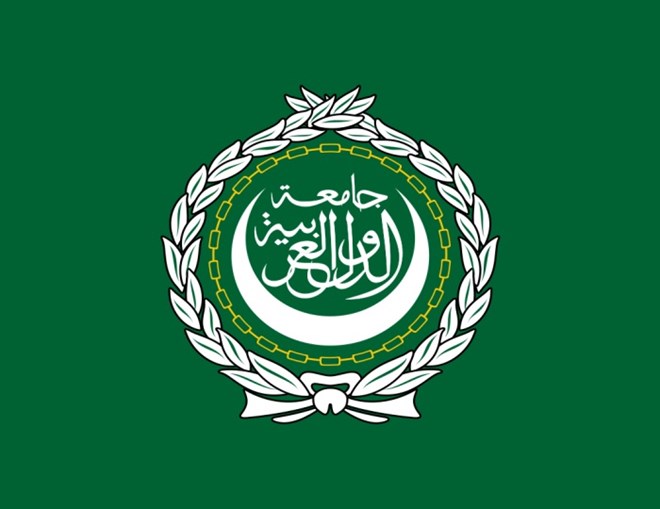
Cairo (HOL) – Ahmed Aboul Gheit, the Secretary-General of the League of Arab States, condemned in the strongest terms the treacherous terrorist attack that took place today, Saturday in the Somali capital, Mogadishu.
Two car bombs exploded in succession at the Somali Ministry of Education, killing dozens of innocent civilians, including humanitarian relief personnel, and wounding large numbers of other citizens.
The Secretary-General expressed his sincere condolences to the families of the martyrs and the Somali government, wishing a speedy recovery to the wounded and injured.
Gamal Rushdie, the official spokesman for the Secretary-General, stated that the Arab League renews its strong support for the efforts made by the Somali state to confront terrorism, eradicate its roots and restore the state’s role at all levels.
Somalia president: at least 100 people killed in car bombs
Somalia president: at least 100 people killed in car bombs

Source: Reteuters, Sunday October 30, 2022
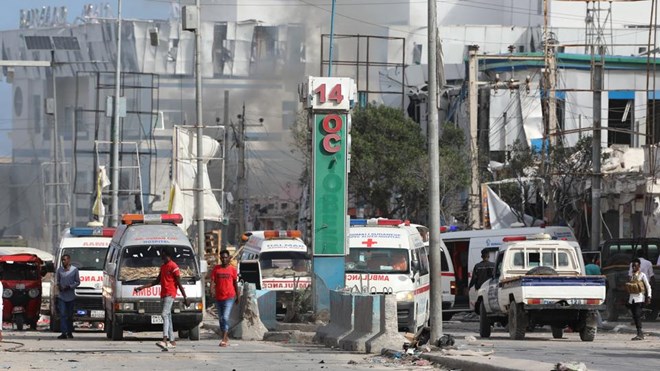
Security personnel and ambulances are stationed near destroyed and damaged buildings after car bombing targeted the Education Ministry in Mogadishu on October 29, 2022. (AFP)
MOGADISHU, Oct 30 (Reuters) – At least 100 people were killed and 300 injured in two car bombs that exploded outside the education ministry in Somalia’s capital Mogadishu on Saturday, the country’s president said in a statement early on Sunday.
“Our people who were massacred … included mothers with their children in their arms, fathers who had medical conditions, students who were sent to study, businessmen who were struggling with the lives of their families,” President Hassan Sheikh Mohamud said after visiting the site of blast.
No one immediately claimed responsibility for the attack, although the president blamed the Islamist group al Shabaab. Al Shabaab typically avoids claiming responsibility for attacks that results in large numbers of casualties.
The first of the explosions hit the education ministry near a busy junction in Mogadishu. The second occurred as ambulances arrived and people gathered to help the victims.
The blast wave smashed windows in the vicinity. Blood covered the tarmac just outside the building.
The attack took place at the same place as Somalia’s largest bombing, which killed more than 500, in the same month in 2017. In that blast, a truck bomb exploded outside a busy hotel at the K5 intersection, which is lined with government offices, restaurants and kiosks.
Mohamud said the number of victims could rise. He had instructed the government to provide immediate medical assistance to the injured, some of whom were in serious condition.
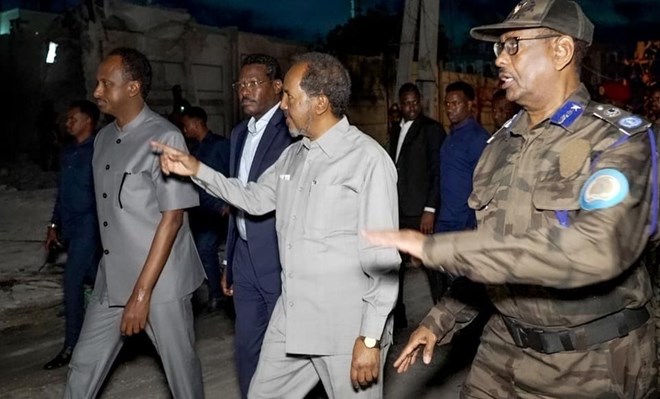
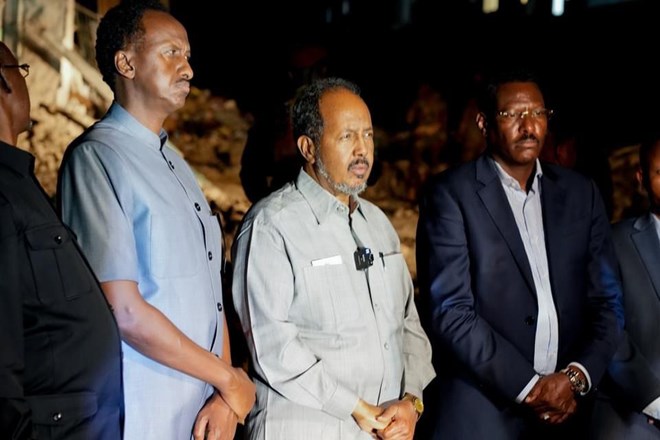
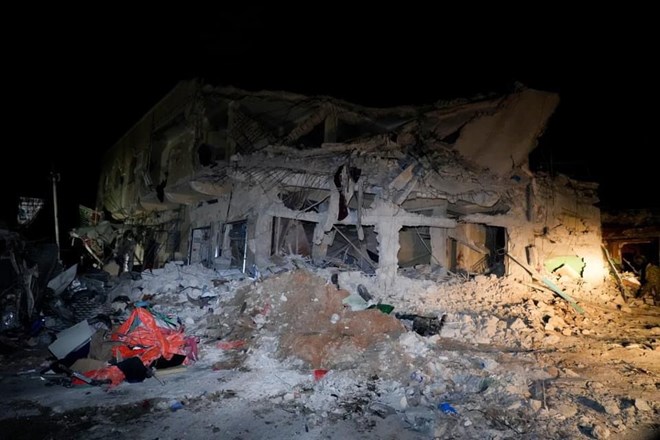
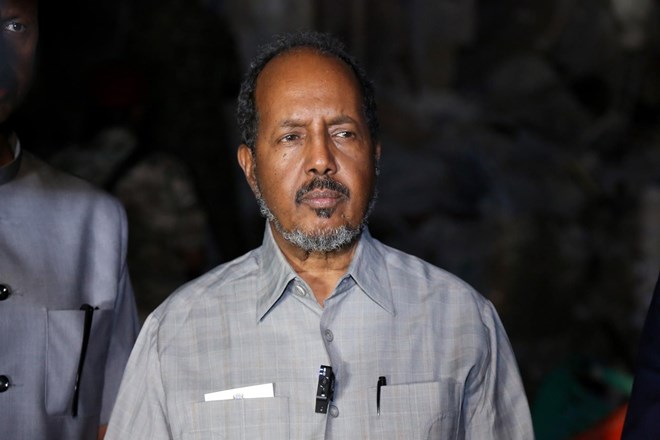

Katastrofläge i Tigray: ”Vi vet att det är ett pågående folkmord
Katastrofläge i Tigray: ”Vi vet att det är ett pågående folkmord”
Source: Sydsvenskan, 26 oktober 2022 09:00
Människorättsorganisationer varnar för ett pågående folkmord i norra Etiopien. Nu tar etiopiska och eritreanska styrkor allt mer mark, medan förhandlingar mellan parterna pågår i Sydafrika. Samtidigt bombas den svältande befolkningen.
– Det är ett enormt lidande vi talar om, säger Kjetil Tronvoll, professor i freds- och konfliktstudier.
Text:
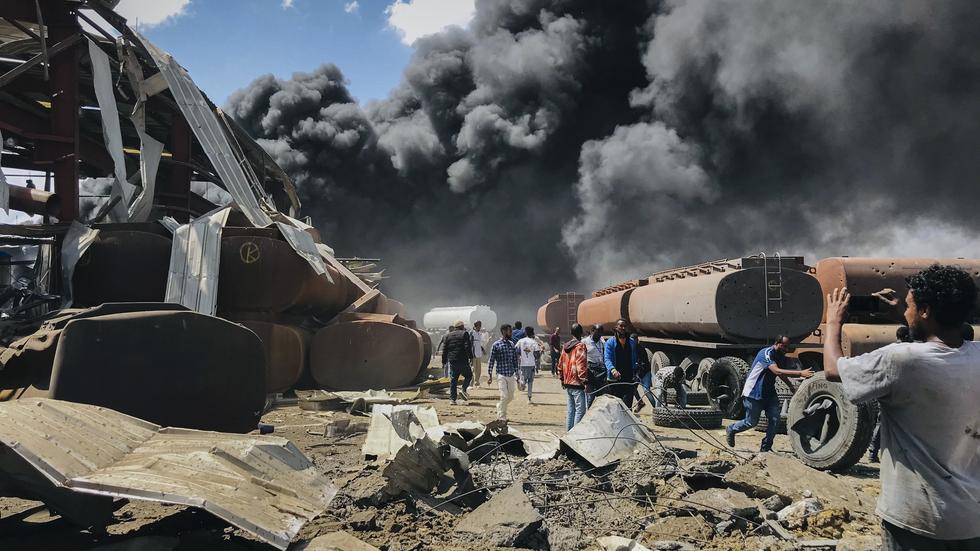
På tisdagen inleddes fredsförhandlingar mellan Etiopiens regering och TPLF, Tigreanska folkets befrielsefront, som de facto styr i regionen Tigray i norra Etiopien. Detta efter veckor av eskalerade angrepp från etiopiska och eritreanska styrkor.
Shift in East Africa’s rainy season offers ‘glimmer of hope’ in drought
Shift in East Africa’s rainy season offers ‘glimmer of hope’ in drought

Source: Newsweek, Wednesday October 26, 2022
BY ROBYN WHITE 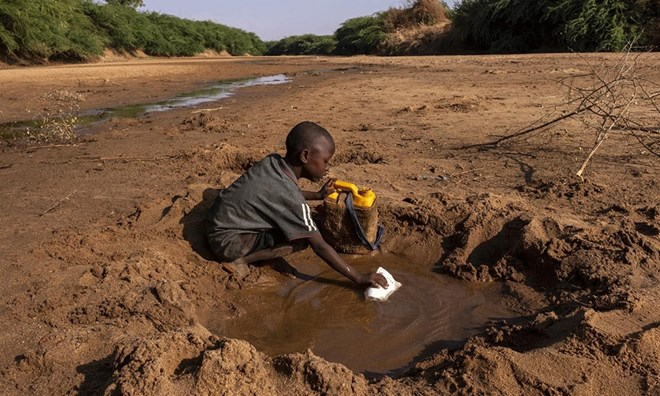
East Africa—particularly Ethiopia, Somaliland, Somalia, and Kenya—is in the middle of one of the worst droughts the region has ever seen after five consecutive failed rainy seasons. Some scientists have already forecasted a sixth failed rainy season next year. This has meant the land is barren and dry, causing serious consequences to people’s livelihoods.
Oxfam has predicted one person could die every 48 seconds due to the drought. Many experts believe that the drought is a direct consequence of climate change.
The study published by AGU and the University of Bristol on October 19 was authored by Dr. Markus Adloff—researcher in the School of Geographical Sciences in Bristol—and Dr. Katerina Michaelides, associate professor in dryland hydrology at the University of Bristol.
It found that improved groundwater management could also hold the key to combating the severe impacts of the drought.
While rainfall is declining in East Africa’s drylands, scientists found that the total underground water storage seems to be increasing. This presents a “much-needed glimmer of hope,” according to a University of Bristol release.
“Multiple consecutive drought seasons such as what we are seeing today are catastrophic for communities so strongly reliant on rainfall. Water and food scarcity is compounded with every failed rainy season, and resources and livelihoods have no opportunity to rebound. Thus, very quickly rainfall scarcity results in failed crops which then leads to food scarcity and food scarcity becomes a food crisis, ultimately leading to famine. Equally, water shortages result in illness and death for both animals and, sadly, humans, especially children,” Michaelides told Newsweek. “[This] may potentially provide a much-needed lifeline to water-insecure communities. Our research points to a nuanced aspect of rainfall changes which bring a positive twist to an otherwise gloomy outlook.”
Analysis by scientists found that while total rainwater from the rainy season, known as “long rains,” is decreasing, it is rising in the other rainy season, known as “short rains.”
This could be because, while rains are decreasing during the typically wet months of March, April and May, heavy rainfall is becoming more common in October, November, and December.
Michaelides said this was important to note, as heavier rainfall in these dryland environments produces runoff and streamflow in otherwise dry river beds. This more readily percolates through the soil, whereas light rainfall tends to evaporate more quickly back into the atmosphere before it can percolate deep underground.
“So the intensity of rainfall within a rainy season may be actually more important for groundwater replenishment than the total amount of rainfall,” Michaelides said.
These findings stress how important it is to continue research into the changes in rainfall characteristics, she said.
This study is just the beginning of finding out whether this groundwater could be useful to communities.
The next step would be to set up groundwater surveys across the region to look into it further.
“Once these assessments are complete, and if they find a positive outlook, it stands to reason that international banks, NGOs, donors, and governments of East Africa can work together to support the development of this precious resource in close consultation with rural communities who depend on it the most,” Michaelides said.
AU welcomes talks to end Tigray war
AU welcomes talks to end Tigray war

Source: BBC, Wednesday October 26, 2022
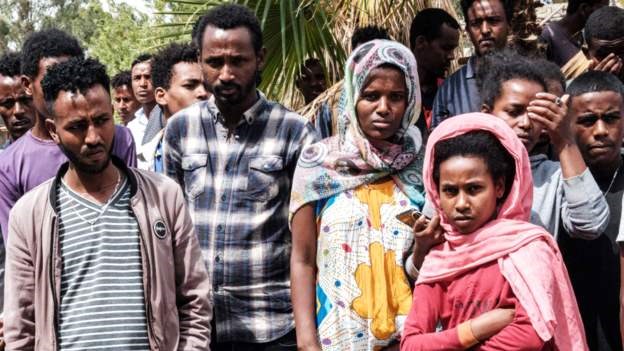
The war in Tigray in northern Ethiopia has caused a massive humanitarian crisis
The chairman of the African Union commission has welcomed the fact that the Ethiopian government and Tigrayan forces have entered into talks aimed at ending the war that has devastated Ethiopia’s northern Tigray region.
Moussa Faki said he was “encouraged by the early demonstration of a commitment to peace” in the talks being held in South Africa.
The AU-appointed mediators are the former presidents of Nigeria and Kenya, Olusegun Obasanjo and Uhuru Kenyatta respectively, and South Africa’s former Deputy President Phumzile Mlambo-Ngcuka.
The UN, US and the East African regional body, Igad, had observer status at the talks, Mr Faki added.
UN: Almost 1 million drought-hit Somalis in al-Shabab areas
UN: Almost 1 million drought-hit Somalis in al-Shabab areas

Source: AP, Wednesday October 26, 2022
By CARA ANNA
The United Nations says close to 1 million drought-affected people in Somalia are in areas under the control or influence of the al-Shabab extremist group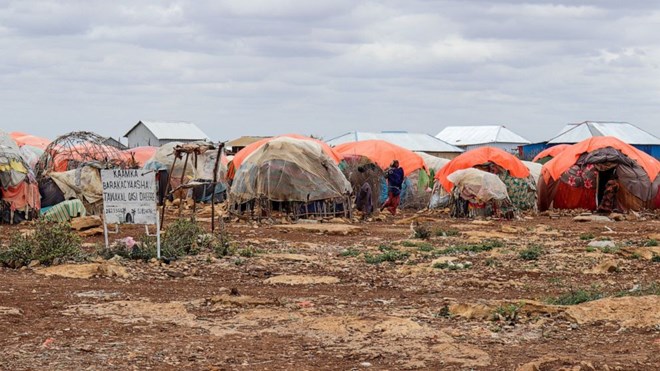
A woman walks past makeshift shelters at a camp for the internally-displaced on the outskirts of Baidoa, in the South West State of Somalia, Wednesday, Oct. 12, 2022. The World Food Programme said Thursday, Oct. 20, 2022 it is delivering life-saving food and nutrition assistance to over 4 million people a month to prevent famine in the face of the region’s worst drought in over 40 years. (Geneva Costopulos/WFP via AP)
NAIROBI, Kenya — The United Nations says close to 1 million drought-affected people in Somalia are in areas under the control or influence of the al-Shabab extremist group, and it appealed to the fighters to allow humanitarian access as famine threatens the country.
The U.N. secretary-general’s special representative in Somalia, James Swan, told journalists Wednesday that the 900,000 people in those areas represent a “relatively small” share of the more than 7 million in need as the Horn of Africa country faces its worst drought in several decades. Thousands of people have died, including many children.
“It is obviously regrettable” that access remains difficult because of al-Shabab, Swan said, adding that talks continue with Somali organizations and private sector entities that might be able to reach places controlled or under the influence of the extremist group.
Al-Shabab’s hostility to aid efforts during a famine in Somalia a decade ago was a factor in the deaths of a quarter-million people.
The U.N. weeks ago warned that without substantially more international assistance, a rare formal famine declaration could be made for parts of Somalia by the end of the year.
Swan said the next announcement from an ongoing assessment of drought data should be made in the next three weeks.
Somalia, like other countries with long-running humanitarian crises, saw support from many donors drop this year as the focus swung to Russia’s invasion of Ukraine.
Swan noted a “substantial increase in delivery of assistance” in recent months, but the U.N. says more needs to be done.
US Airstrike Policy in Somalia
US Airstrike Policy in Somalia
Source: Just Security published on 21 October 2022 a commentary titled “What the White House Use of Force Policy Means for the War in Somalia” by Sarah Harrison.
The author critiques the lethal strike policy the Biden administration has put in effect in Somalia to combat al-Shabaab.
Ethiopian Peace Talks Resume in South Africa
Ethiopian Peace Talks Resume in South Africa
Source: Reuters published on 24 October 2022 an article titled “First Peace Talks in Ethiopia’s Tigray Conflict to Start in South Africa.”
Delegations from the Ethiopian central government and Tigray Region are meeting in South Africa to resume peace talks under the auspices of the African Union. A US military aircraft transported the head of the Tigrayan delegation, Tsadkan Gebre Tensae, accompanied by US Special Envoy for the Horn of Africa, Mike Hammer, to South Africa.
Civilian Protests in Sudan on One Year Anniversary of Military Coup
Civilian Protests in Sudan on One Year Anniversary of Military Coup
Source: The Associated Press published on 25 October 2022 an article titled “Thousands March in Khartoum on 1st Anniversary of Sudan Coup” by Jack Jeffrey.
One year after the military seized power from a coalition military-civilian government, civilian protesters have again taken to the streets to protest the military’s action and demand a return to civilian rule.
Ethiopia’s Somali region MP killed by officer at Jigjiga Airport
Ethiopia’s Somali region MP killed by officer at Jigjiga Airport

Source: Hiiraan, Tuesday October 25, 2022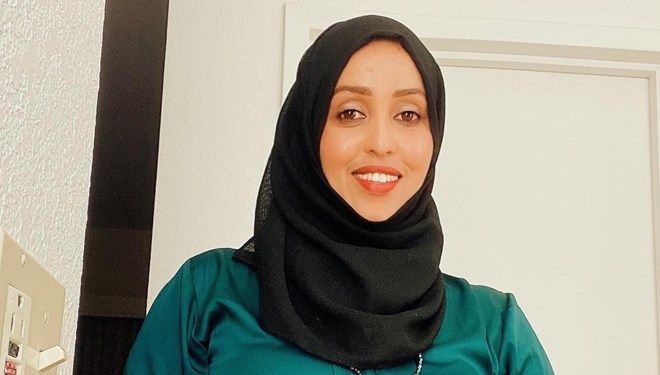
Jigjiga (HOL) – Ethiopia’s Somali regional lawmaker was killed in an officer-involved shooting at Garad Wiilwaal airport in Jigjiga city on Tuesday afternoon.
According to witnesses, an airport security guard opened fire inside the airport, killing the Juweria Sub’is and injuring five others.
Many of the victims were travellers exiting the airport.
The shooting resulted in suspended operations at Garad Wiilwaal airport.
Liyu Police arrived at the airport and arrested the officer who was suspected of opening fire.
An eyewitness told BBC Somali that there was an argument between armed airport security officers before the shooting, although no clear motive has emerged.
Authorities do not believe that incident was terror-related.
The deceased Member of Parliament, who was elected from the Dolo region, spent a lot of time working in humanitarian activities.
